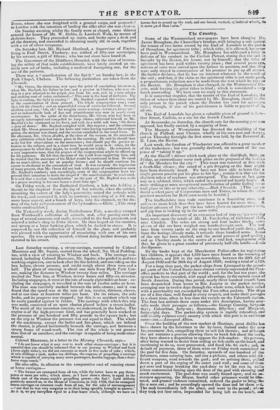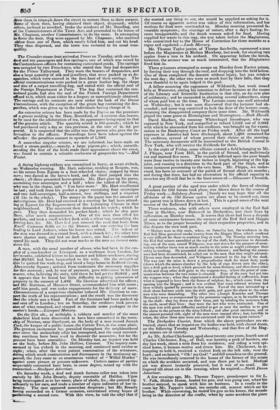E be Countrg.
Some of the Westmoreland newspapers have been charging lira James Brougham, the Chancellor's brother, with bringing a suit aessein. the tenant of two farms owned by the Earl of Lonsdale in the pariah. of Brougham, for agistment tithe; which tithe, it is affirmed, has newer been paid in Westmoreland. Mr. Brougham has addressed a letter in defence of his conduct to the Carlisle Patriot, stating that the snit is brought by the Rector, his lessor, not by himself; that the tithe elf agistment has been paid within twenty years ; that several years lean, notices of suits were served upon the farmer in question, and that they were only stayed in consequence of his promise to pay up all arrears:. He further declares, that he has no interest whatever in the resrek the suit ; and that, if the claim to the agistment tithe is not made .gooii, a proportionate reduction must be made from the rent which he pays to the Rector. Mr. Brougham is also charged, in the Westmorelatul Gs- zette, with levying his great tithes in kind ; which is considered a very harsh proceeding. We have seen no reply to this statement. It is somewhat singular, that the tenant of the Earl of Lonsdale, the tithes of whose farm alone are rented by Mr. Brougham, should be the only person in the parish whom the Rector has stied for agistracet tithe ; though, if one of his parishioners is liable to payment ef all are.
The Earl of Lonsdale has given a valuable piece of ground in Laws- ther Street, Carlisle, as a site for the Scotch Church.
avas At Sevenoaks, on Saturday, the church-rate for the ensuing year opposed, but finally carried, by a majority of four.
The Marquis of Westminster has directed the rebuilding of ele. church at Pulford, near Chester, wholly at his own cost and (harass; and on Thursday fortnight the first stone was laid, by the Reverend. R. Lyon, the Rector.
Last week, the freedom of Winchester was offered to a great sneetlez- of the tradesmen ; but was generally declined, on account of the en- pense of " taking it up."
At the Sheriff's dinner which took place at the Guildhall, Hainan& Friday, an extraordinary scene took place on the proposal of the haid:a of " the Members for the city." This toast was received at tiras wkh a death-like silence ; the sound of a pin dropping on the floor might have been distinctly heard. We have not been able to learn that a single person present put his glass to his lips ; - certain it is that not the slightest token of applause was attempted. The silence at last gave way to a subdued titter, which ended in a general and hearty lang3s. A. more striking or more unequivocal manifestation of public feeling lessee took place in this or in any other city. —Bath Chronicle. [This ass doubt a select party of Corporation men and Tories, to whom th_c pendent members for Bath must needs be hateful.]
The Staffordshire iron trade continues in a flourishing Staff. 014 orders ere more brisk than they have been known for some tinge A further advance of 10s. per ton has taken place on manufactured iron, and pig iron is looking up in the same ratio.
An important discovery of an extensive bed of iron ice eras resseisay been made upon the estate of Mr. H. Fazakerley, of Gillebrand Hall, near Chorley. The veins are strong and four inches thick ; some pieces of the ore have weighed one hundredweight each. The bed runs from twenty yards on the crop to one hundred yards deep; and, from the borings already made, it extends three hundred acres. Some of the ore has been smelted, and the metal proves of good Tidies' ; and as Chorley stands in the centre of it coal-bed, employment
thus be given to a great number of previously half-idle bands.—Leech Intelligencer. By the books kept at the Manchester Police-office for registerieg lost children, it appears that 1,910 have been found in the township of Manchester, and 219 in the out-townships, between the 20th day of August 1832 and the 20th day of August 1833; making a total of
For a long time past, the packet-ships from Liverpool to the princi- pal ports of the United States have almost entirely superseded the Post- office packets to that part of the world ; and, for the last ten years, the system has been extended, with equal advantage, to the eastern coast of South America. During that period, nearly three hundred vessels have been despatched from hence to Rio Janeiro in the packet sere/sae, averaging one in twelve days through the whole term, which have sailed with a punctuality not exceeded by the Post-office packets. The ships are of a fine class, well found in every respect, and make their passages in a short time, often in less than the vessels on the Falmouth station.. The four last arrivals there come under this description, having tien.--e. - rally made their passages as follows,—the George Canning, forty-sin days; Colombian, forty-six; Statesman, fifty-five ; and Margaret, forty-eight days. The packet-ship system is rapidly extending, and will shortly embrace every country with which this port is in extensive connexion.—Liverpool Albion.
Since the building of the new market at Hastings, great dislike ban been shown by the fishermen to the by-laws, framed under the new
Improvement Act, compelling them to sell fish therein ; and ahhosvia the act contains a proviso allowing them to hawk fish about the town,
they have shown a disposition to oppose the fish-market. Si:ape-seems. after being warned to desist from selling on fish-stalls on the beach,and continuing to do so, were prosecuted, and fined 13s. ed. each ; and, in default of payment, three of them were on Friday week committed tee the gaol for five days. On Saturday, upwards of one hundred ce- fishermen, some carrying bats, and one a pickaxe, and others with slit - ferent weapons, went towards the gaol; and on arriving there, pact! down a part of the coping of the outer yard wall; and some of .,test got over and began breaking the yard-door to let the rest in, mile others commenced forcing open the door of the gaol with-shouting nad much excitement. The gaol-door was nearly forced open; and no as- sistance appearing, the Mayor, fearful other prisoners wotilii:he lib's- • rated, and greater violence committed, ordered the gaoler to brire dee din e men out; and he accordingly opened the door and let them eats; The mob immediately left the place, and went to the pound; they took gut four carts, impounded for being left on the beach, and leavr them in triumph down the street to restore them to their owners. ',Name of them then, having obtained their object, dispersed; whilst others, inclined to mischief, broke the windows of Mr. Standing, one el the Commissioners of the Town Act, and proceeded to the house of Kr. Chapman, another Commissioner, to do the same. In attempting to force the door, they were opposed by Mr. Chapman ; who received allow from one of them, which nearly felled him, and cut his head. They then dispersed, and the town was restored to its usual tran- quality.

















 Previous page
Previous page